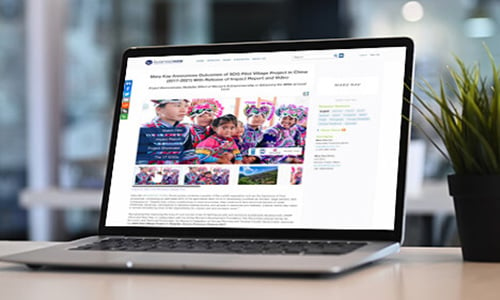Everyone is talking about Clubhouse – but is this a chat app, marketing tool, or a new way to connect reporters and industry experts around the globe? We asked seven journalists for their experiences and thoughts on Clubhouse and the opportunities it held for media relations.
Clubhouse launched in April 2020 as an invitation-only audio chat iPhone app. Through this platform users create and join audio “chat rooms” to engage in conversations on a huge range of topics from AI to cannabis to meditation, or just listen. While Clubhouse was active from the start, it became a global phenomenon when celebrities and CEOs such as Tiffany Haddish, Elon Musk and Mark Zuckerberg joined in. Additionally, Twitter, Facebook and LinkedIn recently announced similar services.
Clubhouse for PR
A year later, Clubhouse has become a learning and educational tool for PR professionals and journalists all over the globe. When I joined a few media-specific rooms, I observed how journalists and publicists openly discuss dos and don’ts of pitching, cold-calling and messaging via Instagram at the eleventh hour. It is here that PR professionals research, gather insight on upcoming stories and stay on top of the emerging trends. Together with journalists, they explore working with various media outlets and learn how to pitch their story.
PR pros can also expand their knowledge base and identify new opportunities in Clubhouse’s topic-based rooms, where they’re able to listen to conversations directly or indirectly related to their brand or industry. Within these rooms, PR pros can learn from and engage with reporters, building relationships based on useful information sharing, not a pitch.
For media outlets, the app provides the opportunity for publications to connect with their readers directly and in real time. For example, Insider created its own club of weekly conversations, “Insider,” in which their journalists cover a variety of topics from influencers to the stock market, and answer audience questions.
To identify exactly how reporters are using Clubhouse, we asked the following seven reporters who are active on Clubhouse for their candid opinions about the app, and offer our media relations takeaways on how PR pros can use the app to increase results:
- Stefan Blitz, Editor-in-Chief of Forces of Geek
- Hilary Brueck, Senior Health and Science Reporter at Insider; participates in ‘Insider’ club
- Elisabeth Buchwald, Personal Finance Reporter at MarketWatch
- Maude Garrett, on-camera host for 14 years for shows including NBC Universal, BBC America, Discovery, Nerdist, specializes in entertainment, film/tv, pop and geek culture, gaming and streaming; co-founder of “Talk nerdy to me” club
- Bryce Gruber, writer at NewsBreak and Reader’s Digest; moderator of “Mastering Media” club
- Sherri L. Smith, Editor in Chief of Laptop Mag; tech and games journalist; co-founder of Platform Agnostic; co-founder of Hotline Tech
- Aly Walansky, freelance lifestyle journalist at Food Network, Today Show, Brides, Forbes, PopSugar, AllRecipes, Men’s Health Magazine, Men’s Journal and Bravo TV; moderator of “Mastering Media” club
How Are Journalists Using Clubhouse?
- To stay connected: “I’ve missed overhearing conversations strangers have on subways or elevators. Clubhouse (and Twitter Spaces for that matter) have managed to bring back those spur-of-the-moment conversations we’d otherwise be naturally surrounded by,” says Elisabeth Buchwald.
- To network with colleagues, PR professionals and industry minds alike: “It absolutely is the networking tool that can widen your contact pool immensely! It’s been an amazing platform during COVID since there are so many restrictions in place and events canceled. The people you'd usually meet at a convention or on business trips can be found in abundance on the app. Not only is it an incredible way to bring people together during a pandemic, but also a great way to meet like-minded people who are interested or work within your niche world,” says Maude Garrett.
- To create brand awareness, attract new audiences and get immediate feedback: “Hosting events at Insider, we hope that people will tune in. [It] creates brand awareness and brings people in who might want to subscribe. I, personally, as a reporter, really appreciate how it is a platform where you get to know the kinds of questions people have in real time. People show up and ask questions there, so you see what's really on people's minds in real time; it’s of one of the benefits of the platform. It's not like Facebook, or Twitter, or Instagram where people are sending posts and information out there to be consumed. [In Clubhouse] people are really asking questions in real time…” says Hilary Brueck.
- To find story ideas/leads: “I’ve absolutely gotten story ideas from conversations that began in a Clubhouse room! Sometimes crowdsourced ideas or thoughts or opinions are super valuable,” says Aly Walansky.
- To find diverse voices: “As a journalist, I’ve found Clubhouse is a great way to connect with more racially diverse and professionally diverse people who I otherwise wouldn’t have come across in the usual ways I go about sourcing for stories... I have really enjoyed popping into rooms on the app because I get to [hear] raw stories and experiences from people that aren’t necessarily media-trained and likely aren't intentionally trying to get journalists to report on them,” says Elisabeth Buchwald.
- To find new freelancers for assignments: “I want my room to look like the city I live in – New York. If I could get someone that people wouldn't expect to be a tech writer on staff or at least freelancing, that's a big win for me… I had a conversation with a music producer about freelancing a few articles on topics that I'm passionate about, but I don't necessarily have the bandwidth to cover. If I can get a professional that has experience with these gadgets, that's a huge win,” says Sherri L. Smith.
- To create a community with potential experts, publicists and colleagues: “There are PR people that I've seen in my email inbox, but I couldn't put a face to a name… and now I feel like I've gotten to interact with them on a little bit more of a personal level. I've placed a lot of stories through publicists that have just been in ‘Media chat’ rooms. It’s a community thing… the room really doesn't benefit me or have any impact on my work, but it impacts someone else's work. It’s like a good karma ecosystem: when you're helping the publicist, then they keep coming back, and when you have a story you need help with, you've got, like, an army of publicists that have the expert for you. This is how you form a community,” says Bryce Gruber.
What Are the Pros of using Clubhouse?
- Alternative to Zoom or Microsoft Teams meetings: “I have a little bit of Zoom fatigue, so it's a nice way to be in a conversation, but you don't have to dress up or, you know, necessarily be staring at a screen the whole time, so I think the audio aspect of it is appealing to people right now,” says Hilary Brueck.
- New format for audio interactions: “I love that unlike all other social media – it doesn’t involve being camera-ready. I can be cooking, cleaning, emailing – and still participate in an incredible conversation – and do so with no makeup and in my pjs. That’s a breath of fresh air these days,” says Aly Walansky.
- Variety of topics: “Just the span of topics that are featured on Clubhouse is so big, just take a look at the technology header alone: you have startups, you have people talking about cryptocurrency, you have people talking about Apple, AI, big tech and politics – you name it, you can find it on Clubhouse and usually have really informed passionate people speaking on the subject,” says Sherri L. Smith.
- Lack of pressure: “With Clubhouse, it can feel a lot like a dinner table conversation, all the way to a massive seminar or TED Talk. The experience for the user, whether speaker or listener, feels far more enriching,” says Maude Garrett.
What Are the Cons of Using Clubhouse?
- Exclusivity: Currently this is an invite-only app. “There are still a lot of limitations that I think have held Clubhouse back. No support of the Android platform. (Android version is expected around summer 2021) and a limitation of creating groups, I'd like to think that everyone should be able to create one group,” says Stefan Blitz.
- No direct message capabilities: “One thing that has irked me a bit about Clubhouse is there's no way to DM someone in-app,” says Elisabeth Buchwald.
- Lack of accountability. This might include a false sense of freedom as, officially, conversations are not supposed to be recorded, and a potential break of etiquette. “Theoretically since it's not being recorded, you're free to say whatever you want to say, but that's a double-edged sword... You still should conduct yourself, as if your mother or someone that you like and respect is listening,” says Sherri L. Smith.
- No validation of credentials / Not a reliable news source: “I do not use Clubhouse for sources. I don't feel like I can rely on anyone's expertise unless they're verified, qualified, have proven themselves or I know them in real life... there's a lot of ideas being bounced around with no way to own said ideas or concepts, which is ripe for others to take and claim as their own. I've encouraged users to stick to sharing experiences only, and not to give out advice or information that they themselves cannot source or prove,” says Maude Garrett. Sherri L. Smith concurs: “It's on the listener to make sure that when they go into a room, they look at whose room it is and see what their credentials are… Research who you're listening to because not everyone is an expert, and not everyone has the purest intentions at heart.”
Looking ahead: Predictions for Public Relations
Since its launch, Clubhouse has provided new opportunities for media professionals to network all over the globe, find new diverse voices, uncover story ideas, expand the pool of freelancers and meet PR and media professionals without leaving the safety of their homes. “After a year of isolation, I think people are looking to connect on a personal level within their field,” shared Stefan Blitz.
For PR professionals, the app allows an insider’s look in the journalism ‘kitchen’ to see what journalists are writing about now, what trends are they covering, how they prefer to be pitched to and when. Armed with this information – as well as gaining new contacts and re-establishing connections with ‘old’ ones – PR professionals can repurpose knowledge gained on Clubhouse for upcoming campaigns and further advise their teams and clients on how best to utilize the app.
Some companies are already embracing Clubhouse as a marketing tool, using it to complement conferences, thought leadership, webinars and other activities in order to reach participants from anywhere in real time. “Clubhouse is probably the best networking platform during COVID. But it's hard to see why people will continue to use it at the same rates as right now once life returns to something that feels more normal,” says Elisabeth Buchwald. “Personally, I miss going to industry conferences as a reporter. Without a press pass though, it would cost me a lot out-of-pocket to attend. So, I do hope efforts are made to integrate Clubhouse with traditional conferences so more people can partake.”
Is Clubhouse the next big social network? It may be. An audio app that allows for real-time networking in a time when audiences are both tired of being on video and craving human engagement, Clubhouse has all the elements for success.
Journalism Communities to Follow on Clubhouse
Thinking about joining Clubhouse as part of your PR initiatives? Our experts suggest following these top media and communications communities:
- Communications & PR club
- Media Meet-up
- The Press Conference
- PressClub
- Mastering Media club (daily 30-minute media chat)
- Hotline Tech
Get the latest PR, IR, Marketing and Media tips on the Business Wire Blog. Subscribe today!





